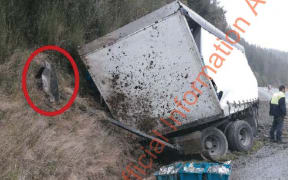A critical shortage of truck safety certifiers is weighing down companies with extra costs and workload.

Photo: 123RF
Among the impacts is certifier burnout and truckers coughing up thousands of dollars to keep rigs on the road or cover for vehicles delayed at testing stations.
Heavy vehicle engineer James Williamson is working seven days a week certifying trucks in Mt Maunganui - he's now thinking of retiring much sooner than planned, within a year instead of several years, though he knows that would only make the certifier shortage worse.
Among the new pressures he's having to deal with; 40 trucks in the last two months failed by vehicle inspection centres when, he said, they shouldn't have been.
"There is a significant increase in minor work that we would simply not have been asked to look at six months ago," Mr Williamson said, citing minor rust as being failed now.
"There's a significant increase in the nervousness of vehicle inspectors that are absolutely scared to make a decision on very minor issues."
It was a serious distraction, he said.
"We, as senior engineers, need to be addressing the serious safety issues that arise in the normal course of business and not to be distracted by minor issues."
An Auckland trucking operator, who RNZ agreed not to name, described both truck certifiers and vehicle inspectors as "s--t scared" and "petrified" of a "completely overboard" crackdown by the Transport Agency.
Late last year, the agency was forced into a humiliating admission of regulatory failings and has since been cracking down on truck certificates of fitness and certifications, and on car warrants of fitness, affecting 50,000 vehicles so far.
The Auckland truckie recently could not find a certifier prepared to recertify three of his rigs, so instead had to spend $20,000 on new towing connections to keep them on the road.
He now expected a truck to be out of action from half to a whole day while at testing stations, due to unprecedented delays getting checked.
"You've got to have a spare truck," the veteran trucker said.
"They've had white-collar guys standing over them, timing them how long it takes to check a truck."
An email circulating in the industry, and obtained by RNZ, claimed vehicle inspectors - who issue WOFs and Certificates of Fitness for trucks - were trying to pass the risks on to certifiers, who design new structural parts for trucks, and do 10-year and five-year calculations around steel fatigue on towing connections and the like.
"As a result of the very high demand, conscientious certifiers are forced to produce many more certificates per day than they may be comfortable with as well as working weekends."
Another problem is the toll taken on certifier capacity by retirements, death and the Transport Agency revoking licences; in Auckland, that has cut the total number by five, to 29 recently.
Two of the revoked certifiers, Patrick Chu of Auckland and Peter Wastney of Nelson, were checking up to four times as many trucks as is usual.
West Auckland certifier Doug Latto said this undercut the market badly.
"If I'd chosen to compete, and I don't, against some pretty poor operators, you can't compete with that," Mr Latto said. "It's not a level playing field."
His experience was of spending a day or two doing design calculations properly, only for the customer to never come back to him again, because they could get it done quickly and cheaply elsewhere.
But with Mr Chu now out of the market, and many of his 11,000 certifications having to be redone, Mr Latto said the pressures in Auckland were extreme.
The trucks certified by Mr Chu, and so far not recertified, can only operate if they lighten their loads by 10 percent - Mr Latto said that's the profit margin gone.
"Essentially what the agency told all these transport operators is, 'Yes, you can carry on using this thing, but you're going to have to work at a loss for the next six months'. Well, no transport operator's going to accept that, so they're just going to hop on their phone and keep ringing till they get someone to come and do their recertification."
Veteran certifier Wayne Johnston is attempting to retire to Waiheke Island but keeps getting called on to do more jobs.
He was not aware of nervous certifiers, or an influx of minor unnecessary jobs - and he blames trucking operators, not the Transport Agency, for the industry's problems.
"Some have been struck off the register for not doing the job properly, because there wasn't enough money in it to do it properly," Mr Johnston said.
"And so, rather than being professionally ethical level, they were being more commercial. It's always been a bit of a pressure from the operators who always want things done instantly at the cheapest possible price."
These cheap rates stopped certifiers training new engineers and most stayed as sole operators, he said.
A survey by the heavy vehicle committee of Engineering New Zealand, done of Auckland certifiers dealing with the Patrick Chu fallout, underscored the concerns.
The committee executive officer, Kelvin Barclay, said in addition to the pressure, testing stations had become more risk averse "to anything that could backfire" on them.
Consequently, he had experienced them asking for an LT400 certificate to repair "fairly minor rust repair issues", which the certifier had to work to produce, otherwise the vehicle would remain barred from the road.
Another certifier, who RNZ agreed not to name, said another problem was NZTA's requirement for new certifiers to be mentored by a qualified engineer certifier approved by the agency.
So they "do what they are told by NZTA without question. Some certifiers have their files 'vetted' by the same approved certifiers. Together with the current climate of revocations, it is no wonder that no-one wants to become a certifier".
It might be time for NZTA to take back the role of certifying trucks itself, the certifier said.
Mr Latto said for the first time in years recently, he told someone with a rustbucket truck he wouldn't certify it, without fearing the truckie would simply get it done elsewhere.
Mr Johnston said he foresaw an end to the ructions.
"You can now start making a profit at what people are prepared to pay because a lot of the oddball stuff is disappearing ... oddball designs; the designs are becoming more standardised. Therefore, they're also becoming easier to analyse, cheaper to manufacture," Mr Johnston said.
The heavy vehicle committee said the Transport Agency was aware of the pressures and in the last week the committee had suggested some options for dealing with them, such as recruiting certifiers from other parts of the country to help out in Auckland.
The Transport Agency has been approached for comment.
Email circulating in trucking industry
The unsigned email circulating in the certification industry and obtained by RNZ:
"The recent events at NZTA have caused extreme anxiety in throughout the transport industry with operators rushing to ensure their vehicles are compliant and vehicle inspectors at testing organisations referring more vehicles for specialist certifier opinions rather than make the decisions themselves. These sectors are demanding more certifications for more and simpler items on vehicles to reduce their own risk but resulting in greater demand for certifications from both repairers and specialist certifiers. The sector where this excessive workload is having the greatest effect is the specialist certification sector, both light and heavy vehicle certifiers.
Specialist certifiers are bearing the brunt of this and suffering excessive workloads, caused, in part, by the testing organisations attempting to mitigate any risks by referring vehicles for certifiers to confirm compliance. This is exacerbated by the fact that there are a reduced number of specialist certifiers due to retirement, death and revocation. For example, in the Auckland area, there are only about half the number of active HV specialist certifiers that there were two years ago while having the highest number of vehicle revocations nationwide due to the revocation of Patrick Chu certified towing connections.
This means that active certifiers are increasingly dealing with an extremely high demand for their services from, in many cases, quite desperate transport operators, that forces certifiers to work extremely long hours and/or employ more support (if they can find capable people). The end result is many more certificates per certifier per month than would be considered normal. This pressure is negative in its effects as the number of specialist certifiers in NZ continues to decline while some currently active certifiers are refusing to take on work that they consider contentious or that could bring them to the attention of the NZTA. This all leads to a critical shortage of specialist certifiers.
As a result of the very high demand conscientious certifiers are forced to produce many more certificates per day than they may be comfortable with as well as working weekends, to the detriment of both their home lives and their own wellbeing.
It is not clear how long it will be before a solution to this issue can be found as other areas in NZ are in no better shape than Auckland with a number of revoked certifications by Peter Wastney and Dick Joyce still to be dealt with and a reduced number of active certifiers."






